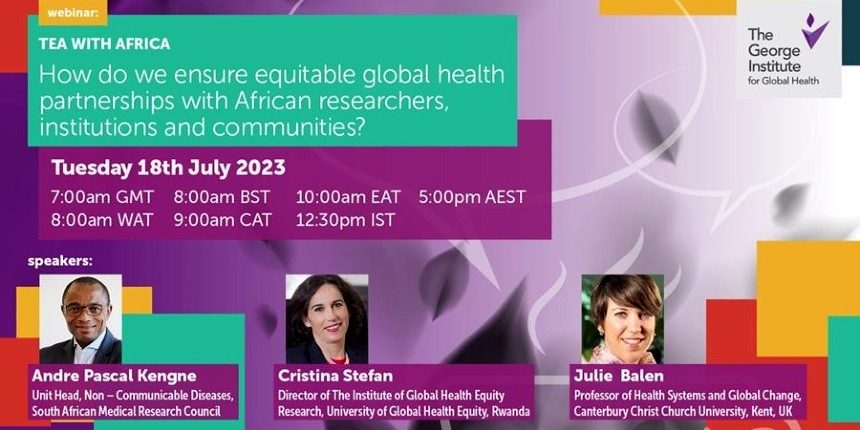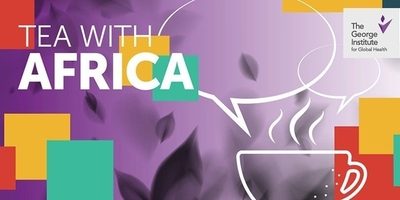
Tea with Africa: How do we ensure equitable global health partnerships with African researchers, institutions and communities?

The George Institute for Global Health invites you to its next webinar in the 'Tea with Africa' conversation series on Tuesday 18th July at 7:00am GMT, 8:00am WAT, 8:00am BST, 9:00am CAT, 10:00am EAT, 1:30pm IST, 5:00pm AEST.
In this panel discussion, the speakers will share their experiences with research partnerships involving African researchers, institutions and communities.
Attendees will gain insights into pragmatic and culturally sensitive approaches to establishing and maintaining equitable partnerships in multiple African contexts
About Tea with Africa
The 'Tea with Africa' series is part of The George Institute's efforts to promote global health collaboration with African researchers, institutions, and communities. Each event allows for the exchange of knowledge between African and non-African researchers. Participants are encouraged to share their unique challenges and solutions, as well as discuss the implications for different regions. Those who wish to contribute more or connect with others are encouraged to share contact information and/or send event reflections for possible inclusion in the event wrap-up blog.
Speakers
A/Prof. Julie Balen - Professor of Health Systems and Global Change, Canterbury Christ Church University, Kent, UK.
Julie Balen is Professor of Health Systems and Global Change at Canterbury Christ Church University, UK. She is also a Visiting Professor at Manmohan Memorial Institute of Health Sciences, Nepal, and an Honorary Senior Research Fellow at the Medical Research Council Unit, The Gambia, at the London School of Hygiene and Tropical Medicine. Julie is an interdisciplinary research leader with 20 years of experience in the field of global public health. Her work spans across multiple areas, including: (i) health systems strengthening for the control and elimination of poverty-related diseases; (ii) health systems resilience to disasters and emergencies, including pandemics; and (iii) health system responsiveness to neglected and stigmatised reproductive health issues.
Julie works closely with multiple academic and non-academic partners in selected settings across Asia and sub-Saharan Africa, in particular China, Nepal, Ghana and The Gambia. She currently leads an award-winning multi-stakeholder network on fertility care in the Global South, and several other projects. With her research and collaborations, Julie aims to transform health services through a systems approach, especially among under-served populations. Julie has extensive experience in teaching and supervision and a passion for professional development and capacity building. She holds a BSc (Hons) in Biology (Imperial College London, UK, 2004) and a Ph.D. in Public Health and Epidemiology (University of Queensland, Australia, 2009). Julie is delighted to have been invited to “tea with Africa” as part of the Thought Leadership Program at The George Institute for Global Health.
Prof. Andre Paschal Kengne – Unit Head, Non – Communicable Diseases, South African Medical Research Council.
Professor Andre Pascal Kengne is a medical doctor and internist from the School of Medicine of Yaounde in Cameroon; and holds a Ph.D. in medicine from the Sydney University, Australia. He is the current Director of South African Medical Research Council’s Non-Communicable Diseases Research Unit, and holds conjoint appointments as Professor at the Department of Medicine of the University of Cape Town, South Africa. His areas of research include chronic diseases epidemiology and prevention in developing countries, decision-making in diabetes and cardiovascular disease. He has a solid background on longitudinal studies methodologies, both interventional and observational, as well as related statistical methods. He has practiced Medicine in Africa, lectured and mentored on issues relating to chronic diseases and conducted research on those conditions at a very high level both in Africa and at the global level. He is co-author of over 450 peer-reviewed articles, book chapters and monographs on chronic diseases in Africa and at the global level. He has received several distinctions during his career as a researcher, and is a member of many international experts and working groups.
Prof Cristina Stefan – Director of The Institute of Global Health Equity Research, University of Global Health Equity, Rwanda.
Professor Cristina Stefan completed her pediatrics residency and Oncology Fellowship at Stellenbosch University in Cape Town, her Masters in Cancer Epidemiology from York University in the UK, Ph.D. in Medical Education and an MBA from ISM in Paris. She was also a fellow at St Jude Children’s Cancer Research Hospital and a fellow of Cancer registration and epidemiology program at IARC in Lyon. Professor Cristina has published 3 books, 18 chapters, and more than 125 articles so far.
She has served at different leadership positions including head of the department of oncology at Tygerberg Hospital and Stellenbosch University and Vice-President of the Medical Research Council in South Africa. She was the past president of AORTIC, founder of the African Cancer Institute and the African Medical, Research and Innovation Institute. She also served as chair and founder of the African Cancer Economics Network and chair of women in global oncology. Currently, she is involved in global oncology, consulting for WHO, and helping shape Global Cancer Control Plans. In recognition of her contributions to science and community advancement, she was voted as the most influential woman in business and government in Africa in 2016, and in 2019 was nominated among the top 100 healthcare women leaders in Asia.
Host/Moderator: Dr. Kenneth Yakubu
Yakubu completed his undergraduate and medical specialist training in Nigeria and worked as a consultant family physician for four years before migrating to Australia.
Following his clinical training, he earned an MPhil (Family Medicine) from Stellenbosch University in Cape Town, South Africa, and an MBA (Health Units Management) from the Cyprus Institute of Marketing. His research and professional efforts were then focused on understanding and improving the learning experiences of undergraduate and graduate trainees in family medicine, as well as identifying family-centred approaches to improving health service delivery.
He is currently a Ph.D. candidate at the University of New South Wales Faculty of Medicine and Health in Sydney, Australia, and co-leads The George Institute's initiative for collaboration with African researchers and institutions.
His Ph.D. Thesis investigated global and domestic governance systems for skilled health worker migration, the extent to which they feature human rights norms, and the opportunities for achieving equitable global health workforce distribution.
Yakubu intends to conduct more research on sustainable health workforce models and governing systems at the intersection of social justice and health equity.


